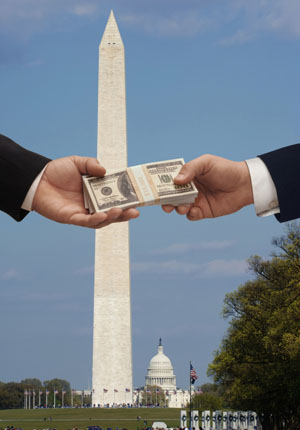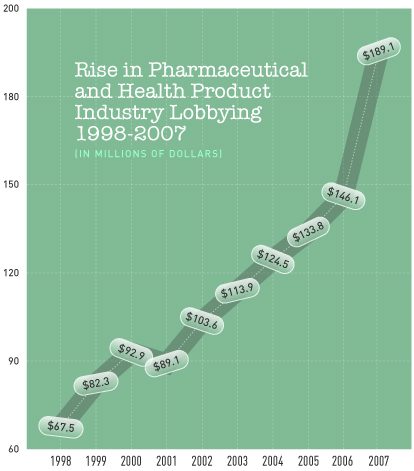
February 24, 2010
Business ethics has become an oxymoron. Wall Street bonuses were up 17 percent to over $20 billion in 2009, the year taxpayers bailed out the financial sector after its meltdown. So, everyone has many reasons to hate the banking and financial sectors that dumped our economy, and the general corruption of American politics by corporate interests.
There are good reasons to detest the pharmaceutical industry. Besides raping people with onerous prices for prescription drugs, corporate greed, coupled with ineffective government regulation and oversight, is actually killing Americans through unsafe drugs.
Enter the newest fiasco, that sweetly named diabetes drug Avandia, so heavenly sounding, yet now revealed to be just another in a long history of drugs that get government approval but turn out to be lethal. According to Bloomberg News: “Safety reviewers at the U.S. Food and Drug Administration urged the agency to take GlaxoSmithKline Plc’s diabetes drug Avandia off the market in 2008 because they said it was causing 500 additional heart attacks per month.” A month! The drug was linked to 304 deaths during the third quarter of 2009, which implies many thousands of deaths to date.
Consider these depressing developments. In recent years, pharmaceutical companies have committed acts that forced them to pay the largest criminal fines in American history. In cases involving Pfizer, Eli Lilly, Bristol Myers Squibb and four other drug companies, these fines and penalties have totaled over $7 billion since May 2004. That is an amazing number, but in comparison to drug industry profits, merely a pittance.
In particular, Pfizer has been fined multiple times in the past 6 years for illegal off-label promotion of their drugs. In its latest plea agreement, which took place last September, Pfizer paid $2.3 billion in fines and penalties for off-label promotion of Bextra. This settlement was the largest criminal fine in US history. Clearly, this kind of corporate behavior requires diligent oversight by the Food and Drug Administration to protect Americans and to ensure the safety of American medicine. Yet this newest Avandia outrage proves, yet again, that the federal government is failing people.
The Senate Finance Committee has just released a report and a letter to the FDA. They have revealed that the FDA itself estimated that the drug caused approximately 83,000 excess heart attacks between 1999 and 2007. “Americans have a right to know there are serious health risks associated with Avandia and GlaxoSmithKline had a responsibility to tell them. Patients trust drug companies with their health and their lives and GlaxoSmithKline abused that trust,” said Senator Max Baucus.
The Senate committee started their investigation after the New England Journal of Medicine published a study in May 2007 warning of the possible cardiovascular risk of Avandia. Avandia entered the market in 1999 and reached annual revenue of $3 billion by 2006, including sales of a combination drug that includes Avandia. Sales plummeted to $1.2 billion in 2009, two years after that study was published which linked Avandia to a 43 percent increased risk of heart attack. Before that the drug was the company’s second best selling drug, and they did everything to protect sales, rather than users of the drug.
The Senate report provides incredible details on how the drug company pursued countless awful tactics to thwart many efforts to reveal to the public and the medical community just how unsafe Avandia is. The report notes: “The totality of evidence suggests that GSK was aware of the possible cardiac risks associated with Avandia years before such evidence became public.… Based on this knowledge, GSK had a duty to sufficiently warn patients and the FDA of its concerns in a timely manner. Instead, GSK executives intimidated independent physicians, focused on strategies to minimize findings that Avandia may increase cardiovascular risk, and sought ways to downplay findings that the rival drug ACTOS (pioglitazone) might reduce cardiovascular risk.”
The company continues to fight to keep its drug on the market. You can imagine the army of lobbyists being used to safeguard the interests of drug companies. Other industries exhibit the same behavior, giving us widespread corporate pillage.

Center for Public Integrity
I, and millions of other owners of Toyota vehicles, cringe, because, like so many other companies, it lost the capacity for telling the truth and protecting their consumers, and the federal government failed its oversight function. With 31 lobbyists in Washington last year, Toyota has spent nearly $25 million on federal regulatory and legislative lobbying matters in the last five years, much more than any other foreign automaker. Toyota’s registered lobbyists include at least eight former officials from Congress and the executive branch and it employs former engineers and officials from the National Highway Traffic Safety Administration, the regulatory agency that failed to detect a pattern of safety problems at Toyota.
Put aside the anti-government rhetoric of the Tea Party movement. The critical need is not for less government but for better government that really works in the public interest, especially protecting consumers from dastardly corporate powers. Until that happens it is not surprising that the recent Washington Post-ABC News poll found that two-thirds of Americans are dissatisfied or angry about the federal government. Nearly 75 percent of independents feel this way. If you think that electing either Democrats or Republicans will fix broken government, think again. Both major parties are corrupted by corporate interests.


 The Hunger Site
The Hunger Site
No Comments
Comments for Widespread Corporate Pillage are now closed.